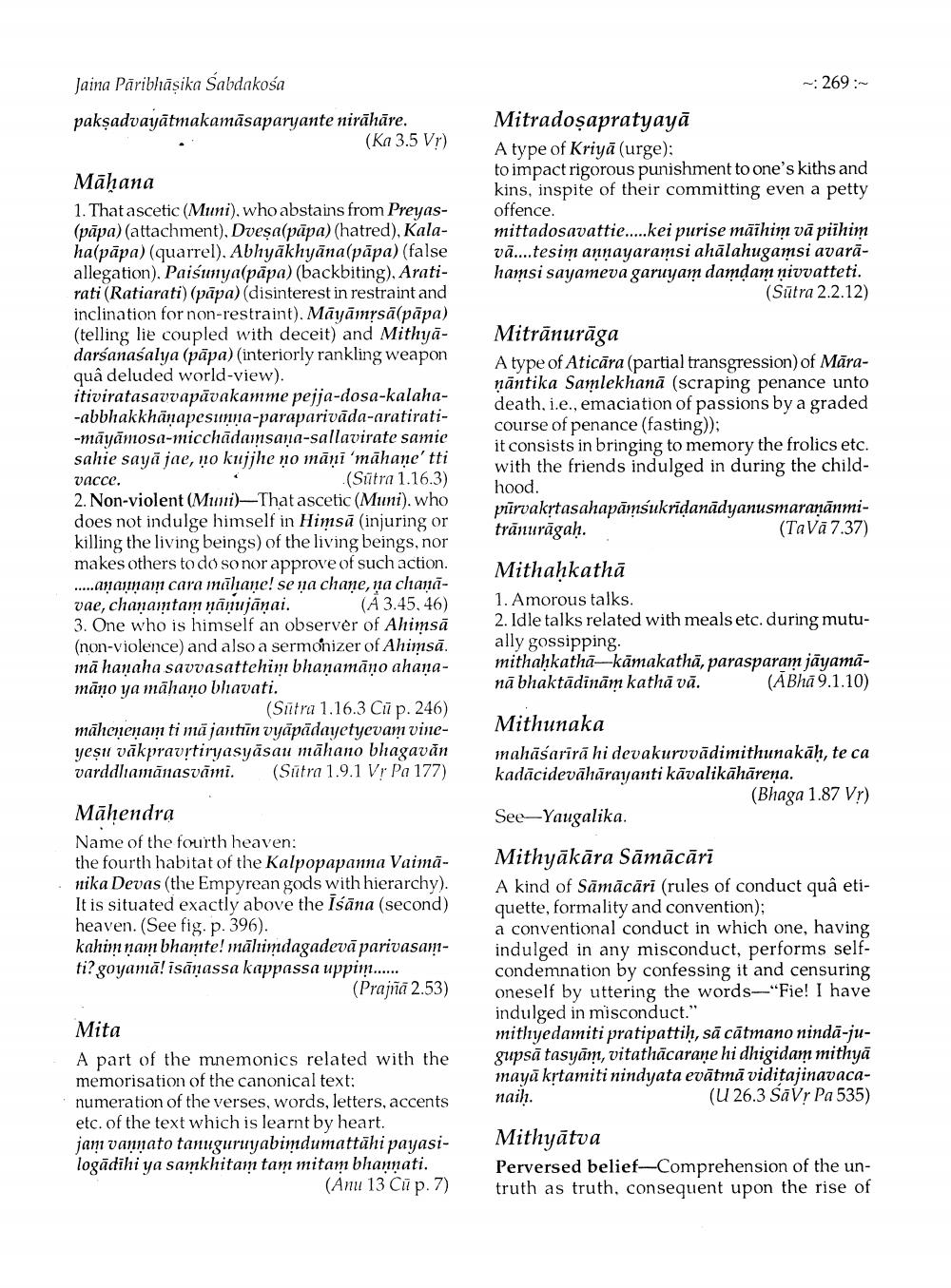________________
- 269:
Jaina Pāribhāșika Sabdakosa pakşadvayjātmakamāsaparyante nirāhāre.
(Kn 3.5 Vr)
Mitradosapratyayā A type of Kriyā (urge); to impact rigorous punishment to one's kiths and kins, inspite of their committing even a petty offence. mittadosavattie....kei purise mäihim vā piihim vā....tesim annayaramsi ahālahugamsi avarāhamsi sayameva garuyam damdam nivvatteti.
(Sutra 2.2.12)
Māhana 1. That ascetic (Muni), who abstains from Preyas(pāpa) (attachment), Dveşa(pāpa) (hatred), Kalaha(pāpa) (quarrel). Abhyākhyāna(pāpa) (false allegation), Paisunya(pāpa) (backbiting), Aratirati (Ratiarati) (pāpa) (disinterest in restraint and inclination for non-restraint). Māyām;sā(pāpa) (telling lie coupled with deceit) and Mithyadarśanasalya (pāpa) (interiorly rankling weapon quâ deluded world-view). itiviratasavvapāvakamme pejja-dosa-kalaha-abbhakkhänapesunna-paraparivāda-aratirati-māyāmosa-micchādainsana-sallavirate samie sahie sayä jae, ito kujjhe no māni 'māhane' tti vacce.
| (Sutra 1.16.3) 2. Non-violent (Muni)—That ascetic (Muni), who does not indulge himself in Himsā (injuring or killing the living beings) of the living beings, nor makes others to do sonor approve of such action. .....anaiman cara milane! se na chane, na chanavae, chanaitam ņāmujānai. (A 3.45, 46) 3. One who is himself an observer of Ahimsā (non-violence) and also a sermonizer of Ahimsā. mä hanaha savvasattehim bhanamāno ahaņamāno ya māhano blavati.
(Sūtra 1.16.3 Cū p. 246) māhenenam ti mājantīn vyāpādayetyevam vineyeşil väkpravrtiryasyāsau māhano bhagavān varddhamānasvāmi. (Sūtra 1.9.1 V? Pa 177)
Mitrānurāga A type of Aticāra (partial transgression) of Māraņāntika Samlekhanā (scraping penance unto death, i.e., emaciation of passions by a graded course of penance (fasting)); it consists in bringing to memory the frolics etc. with the friends indulged in during the childhood. pīrvakrtasahapāmśukridanādyanusmaraņānmitrānurāgaḥ.
(Tavā 7.37)
Mithaḥkathā 1. Amorous talks. 2. Idle talks related with meals etc. during mutually gossipping. mithahkathā-kāmakathā, parasparam jāyamanā bhaktādinām kathā vā. (ABhā 9.1.10)
Mithunaka inahāśarīrā hi devakurvvādimithunakāh, te ca kadācidevāhārayanti kāvalikāhāreņa.
(Bhaga 1.87 Vr) See-Yaugalika.
Māhendra Name of the fourth heaven: the fourth habitat of the Kalpopapanna Vaimanika Devas (the Empyrean gods with hierarchy). It is situated exactly above the iśāna (second) heaven. (See fig. p. 396). kahim nambhamte! māluimdagadevā parivasamti? goyamā! isānassa kappassa uppim......
(Prajna 2.53)
Mithyākāra Sāmācāri A kind of Sāmācāri (rules of conduct quâ etiquette, formality and convention); a conventional conduct in which one, having indulged in any misconduct, performs selfcondemnation by confessing it and censuring oneself by uttering the words-"Fie! I have indulged in misconduct." mitliyedamiti pratipattih, sā cātmano nindā-ju
gupsā tasyām, vitathācarane hi dhigidam mithyā mayā krtamiti nindyata evätmā viditajinavacanaih.
(U 26.3 SãVr Pa 535)
Mita A part of the mnemonics related with the memorisation of the canonical text: numeration of the verses, words, letters, accents etc. of the text which is learnt by heart. jam vannato tanuguruyabimdumattāhi payasilogādihi ya samkhitam tam mitam bhannati.
(Anu 13 Cup.7)
Mithyātva Perversed belief-Comprehension of the untruth as truth, consequent upon the rise of




